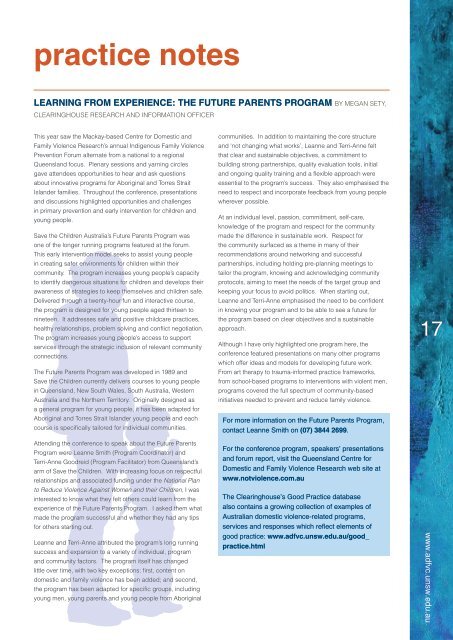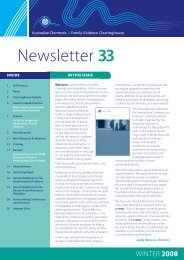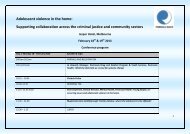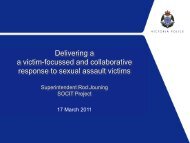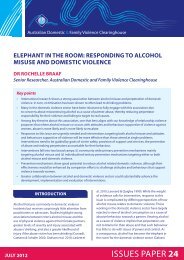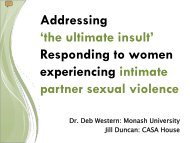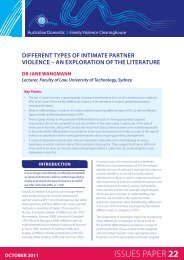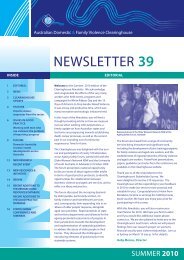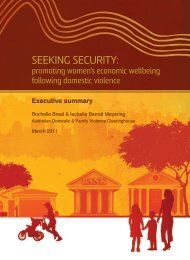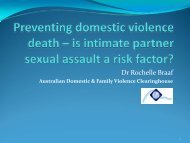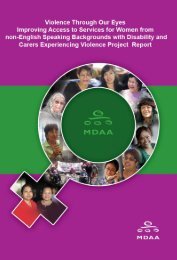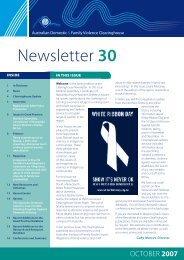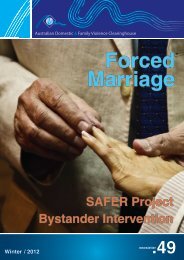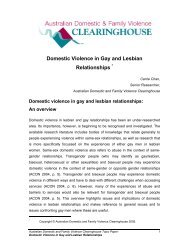Engaging men on their use of sexual violence as a power and ...
Engaging men on their use of sexual violence as a power and ...
Engaging men on their use of sexual violence as a power and ...
You also want an ePaper? Increase the reach of your titles
YUMPU automatically turns print PDFs into web optimized ePapers that Google loves.
practice notes<br />
LEARNING FROM EXPERIENCE: THE FUTURE PARENTS PROGRAM BY MEGAN SETY,<br />
CLEARINGHOUSE RESEARCH AND INFORMATION OFFICER<br />
This year saw the Mackay-b<strong>as</strong>ed Centre for Domestic <strong>and</strong><br />
Family Violence Research’s annual Indigenous Family Violence<br />
Preventi<strong>on</strong> Forum alternate from a nati<strong>on</strong>al to a regi<strong>on</strong>al<br />
Queensl<strong>and</strong> focus. Plenary sessi<strong>on</strong>s <strong>and</strong> yarning circles<br />
gave attendees opportunities to hear <strong>and</strong> <strong>as</strong>k questi<strong>on</strong>s<br />
about innovative programs for Aboriginal <strong>and</strong> Torres Strait<br />
Isl<strong>and</strong>er families. Throughout the c<strong>on</strong>ference, presentati<strong>on</strong>s<br />
<strong>and</strong> discussi<strong>on</strong>s highlighted opportunities <strong>and</strong> challenges<br />
in primary preventi<strong>on</strong> <strong>and</strong> early interventi<strong>on</strong> for children <strong>and</strong><br />
young people.<br />
Save the Children Australia’s Future Parents Program w<strong>as</strong><br />
<strong>on</strong>e <strong>of</strong> the l<strong>on</strong>ger running programs featured at the forum.<br />
This early interventi<strong>on</strong> model seeks to <strong>as</strong>sist young people<br />
in creating safer envir<strong>on</strong><str<strong>on</strong>g>men</str<strong>on</strong>g>ts for children within <strong>their</strong><br />
community. The program incre<strong>as</strong>es young people’s capacity<br />
to identify dangerous situati<strong>on</strong>s for children <strong>and</strong> develops <strong>their</strong><br />
awareness <strong>of</strong> strategies to keep themselves <strong>and</strong> children safe.<br />
Delivered through a twenty-hour fun <strong>and</strong> interactive course,<br />
the program is designed for young people aged thirteen to<br />
nineteen. It addresses safe <strong>and</strong> positive childcare practices,<br />
healthy relati<strong>on</strong>ships, problem solving <strong>and</strong> c<strong>on</strong>flict negotiati<strong>on</strong>.<br />
The program incre<strong>as</strong>es young people’s access to support<br />
services through the strategic inclusi<strong>on</strong> <strong>of</strong> relevant community<br />
c<strong>on</strong>necti<strong>on</strong>s.<br />
The Future Parents Program w<strong>as</strong> developed in 1989 <strong>and</strong><br />
Save the Children currently delivers courses to young people<br />
in Queensl<strong>and</strong>, New South Wales, South Australia, Western<br />
Australia <strong>and</strong> the Northern Territory. Originally designed <strong>as</strong><br />
a general program for young people, it h<strong>as</strong> been adapted for<br />
Aboriginal <strong>and</strong> Torres Strait Isl<strong>and</strong>er young people <strong>and</strong> each<br />
course is specifically tailored for individual communities.<br />
communities. In additi<strong>on</strong> to maintaining the core structure<br />
<strong>and</strong> ‘not changing what works’, Leanne <strong>and</strong> Terri-Anne felt<br />
that clear <strong>and</strong> sustainable objectives, a commit<str<strong>on</strong>g>men</str<strong>on</strong>g>t to<br />
building str<strong>on</strong>g partnerships, quality evaluati<strong>on</strong> tools, initial<br />
<strong>and</strong> <strong>on</strong>going quality training <strong>and</strong> a flexible approach were<br />
essential to the program’s success. They also emph<strong>as</strong>ised the<br />
need to respect <strong>and</strong> incorporate feedback from young people<br />
wherever possible.<br />
At an individual level, p<strong>as</strong>si<strong>on</strong>, commit<str<strong>on</strong>g>men</str<strong>on</strong>g>t, self-care,<br />
knowledge <strong>of</strong> the program <strong>and</strong> respect for the community<br />
made the difference in sustainable work. Respect for<br />
the community surfaced <strong>as</strong> a theme in many <strong>of</strong> <strong>their</strong><br />
recom<str<strong>on</strong>g>men</str<strong>on</strong>g>dati<strong>on</strong>s around networking <strong>and</strong> successful<br />
partnerships, including holding pre-planning meetings to<br />
tailor the program, knowing <strong>and</strong> acknowledging community<br />
protocols, aiming to meet the needs <strong>of</strong> the target group <strong>and</strong><br />
keeping your focus to avoid politics. When starting out,<br />
Leanne <strong>and</strong> Terri-Anne emph<strong>as</strong>ised the need to be c<strong>on</strong>fident<br />
in knowing your program <strong>and</strong> to be able to see a future for<br />
the program b<strong>as</strong>ed <strong>on</strong> clear objectives <strong>and</strong> a sustainable<br />
approach.<br />
Although I have <strong>on</strong>ly highlighted <strong>on</strong>e program here, the<br />
c<strong>on</strong>ference featured presentati<strong>on</strong>s <strong>on</strong> many other programs<br />
which <strong>of</strong>fer ide<strong>as</strong> <strong>and</strong> models for developing future work.<br />
From art therapy to trauma-informed practice frameworks,<br />
from school-b<strong>as</strong>ed programs to interventi<strong>on</strong>s with violent <str<strong>on</strong>g>men</str<strong>on</strong>g>,<br />
programs covered the full spectrum <strong>of</strong> community-b<strong>as</strong>ed<br />
initiatives needed to prevent <strong>and</strong> reduce family <strong>violence</strong>.<br />
For more informati<strong>on</strong> <strong>on</strong> the Future Parents Program,<br />
c<strong>on</strong>tact Leanne Smith <strong>on</strong> (07) 3844 2699.<br />
17<br />
Attending the c<strong>on</strong>ference to speak about the Future Parents<br />
Program were Leanne Smith (Program Coordinator) <strong>and</strong><br />
Terri-Anne Goodreid (Program Facilitator) from Queensl<strong>and</strong>’s<br />
arm <strong>of</strong> Save the Children. With incre<strong>as</strong>ing focus <strong>on</strong> respectful<br />
relati<strong>on</strong>ships <strong>and</strong> <strong>as</strong>sociated funding under the Nati<strong>on</strong>al Plan<br />
to Reduce Violence Against Wo<str<strong>on</strong>g>men</str<strong>on</strong>g> <strong>and</strong> <strong>their</strong> Children, I w<strong>as</strong><br />
interested to know what they felt others could learn from the<br />
experience <strong>of</strong> the Future Parents Program. I <strong>as</strong>ked them what<br />
made the program successful <strong>and</strong> whether they had any tips<br />
for others starting out.<br />
Leanne <strong>and</strong> Terri-Anne attributed the program’s l<strong>on</strong>g running<br />
success <strong>and</strong> expansi<strong>on</strong> to a variety <strong>of</strong> individual, program<br />
<strong>and</strong> community factors. The program itself h<strong>as</strong> changed<br />
little over time, with two key excepti<strong>on</strong>s: first, c<strong>on</strong>tent <strong>on</strong><br />
domestic <strong>and</strong> family <strong>violence</strong> h<strong>as</strong> been added; <strong>and</strong> sec<strong>on</strong>d,<br />
the program h<strong>as</strong> been adapted for specific groups, including<br />
young <str<strong>on</strong>g>men</str<strong>on</strong>g>, young parents <strong>and</strong> young people from Aboriginal<br />
For the c<strong>on</strong>ference program, speakers’ presentati<strong>on</strong>s<br />
<strong>and</strong> forum report, visit the Queensl<strong>and</strong> Centre for<br />
Domestic <strong>and</strong> Family Violence Research web site at<br />
www.not<strong>violence</strong>.com.au<br />
The Clearingho<strong>use</strong>’s Good Practice datab<strong>as</strong>e<br />
also c<strong>on</strong>tains a growing collecti<strong>on</strong> <strong>of</strong> examples <strong>of</strong><br />
Australian domestic <strong>violence</strong>-related programs,<br />
services <strong>and</strong> resp<strong>on</strong>ses which reflect ele<str<strong>on</strong>g>men</str<strong>on</strong>g>ts <strong>of</strong><br />
good practice: www.adfvc.unsw.edu.au/good_<br />
practice.html<br />
www.adfvc.unsw.edu.au


